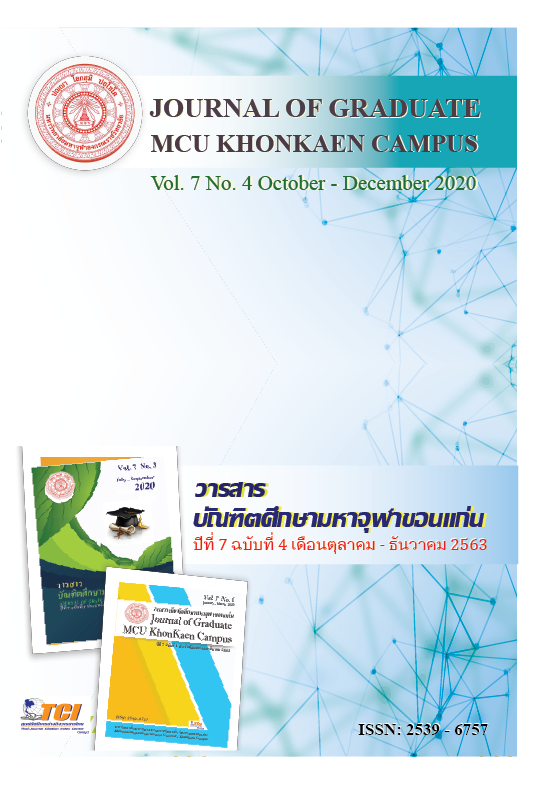การพัฒนารูปแบบการบริหารจัดการสะเต็มศึกษาในโรงเรียนเทศบาล บ้านหนองใหญ่ สำนักการศึกษาเทศบาลนครขอนแก่น
Main Article Content
บทคัดย่อ
การวิจัยครั้งนี้มีวัตถุประสงค์เพื่อ 1) ศึกษาองค์ประกอบและตัวบ่งชี้ของการบริหารจัดการสะเต็มศึกษาในโรงเรียนเทศบาลบ้านหนองใหญ่ สำนักการศึกษา เทศบาลนครขอนแก่น 2) ศึกษาสภาพปัจจุบัน สภาพที่พึงประสงค์ของการบริหารจัดการสะเต็มศึกษาในโรงเรียนเทศบาลบ้านหนองใหญ่ สำนักการศึกษา เทศบาลนครขอนแก่น 3) พัฒนารูปแบบการบริหารจัดการสะเต็มศึกษาในโรงเรียนเทศบาลบ้านหนองใหญ่ สำนักการศึกษา เทศบาลนครขอนแก่น
ผลการวิจัยพบว่า
- 1. องค์ประกอบและตัวบ่งชี้ของการบริหารจัดการสะเต็มศึกษาในโรงเรียนเทศบาลบ้านหนองใหญ่ สำนักการศึกษา เทศบาลนครขอนแก่น มี 6 องค์ประกอบ 38 ตัวบ่งชี้ ดังนี้ องค์ประกอบที่ 1 การพัฒนาหลักสูตร มี 6 ตัวบ่งชี้ องค์ประกอบที่ 2 การพัฒนาครู มี 7 ตัวบ่งชี้ องค์ประกอบที่ 3 การจัดการเรียนรู้ มี 6 ตัวบ่งชี้ องค์ประกอบที่ 4 การนิเทศและประเมินผล มี 6 ตัวบ่งชี้ องค์ประกอบที่ 5 การสร้างเครือข่ายแนวร่วมพัฒนา มี 6 ตัวบ่งชี้ และ องค์ประกอบที่ 6 การวิจัยและพัฒนา มี 7 ตัวบ่งชี้ ผลการประเมินความเหมาะสมและความเป็นไปได้โดยรวมอยู่ในระดับมากที่สุด
- 2. สภาพปัจจุบันของการบริหารจัดการสะเต็มศึกษาในโรงเรียนเทศบาลบ้านหนองใหญ่ สำนักการศึกษา เทศบาลนครขอนแก่น อยู่ในระดับปานกลาง ( =3.40, S.D.=1.04) และสภาพที่พึงประสงค์อยู่ในระดับมาก ( = 4.49, S.D.=0.67)
- 3. รูปแบบการบริหารจัดการสะเต็มศึกษาในโรงเรียนเทศบาลบ้านหนองใหญ่ สำนักการศึกษา เทศบาลนครขอนแก่น โดยใช้การวัดและประเมินผลตามสภาพจริง CTLSCR Model ประกอบด้วย 6 องค์ประกอบ ได้แก่ 1) การพัฒนาหลักสูตร (Curriculum Development) 2) การพัฒนาครู (Teacher development) หมายถึง การสร้างแรงบันดาลใจ การส่งเสริมให้ครูศึกษาด้วยตนเองการกระตุ้นให้ครูคิดสร้างสรรค์และออกแบบกิจกรรมการเรียนรู้แบบสะเต็มศึกษา การส่งเสริมความเป็นผู้นำการเปลี่ยนแปลง (Agent of Change) การสร้างสังคมแห่งการเรียนรู้ (PLC) การประเมินครูสะเต็มศึกษา และการส่งเสริมครูผู้สอนเข้ารับการคัดเลือกครูสะเต็มศึกษาดีเด่น 3) การจัดการเรียนรู้ (Learning management) 4) การนิเทศและประเมินผล (Supervision and evaluation) 5) การสร้างเครือข่ายแนวร่วมพัฒนา (Creating a network of development alliances) 6) การวิจัยและพัฒนา (Research and development)
Article Details
เอกสารอ้างอิง
กระทรวงศึกษาธิการ. (2553). พระราชบัญญัติการศึกษาแห่งชาติ พ.ศ. 2542 และที่แก้ไข เพิ่มเติม (ฉบับที่ 3) พ.ศ. 2553. กรุงเทพมหานคร : องค์การรับส่งสินค้าและพัสดุภัณฑ์.
กมลฉัตร กล่อมอิ่ม. (2559). การจัดการเรียนรู้แบบบูรณาการสะเต็มศึกษา สำหรับนักศึกษาวิชาชีพครู. วารสารศึกษาศาสตร์ มหาวิทยาลัยนเรศวร, 18(4), 334-348.
กมลรัตน์ แก่นจันทร์. (2560). การพัฒนารูปแบบการบริหารงานวิชาการในสถานศึกษาขั้น พื้นฐาน สังกัดสำนักงานเขตพื้นที่การศึกษาประถมศึกษาสกลนคร เขต 3. วารสารศึกษาศาสตร์ มหาวิทยาลัยมหาสารคาม, 11(3), 231-243.
กระทรวงศึกษาธิการ. (2559). รายงานผลการประชุมคณะกรรมการนโยบายสะเต็มศึกษา. กรุงเทพมหานคร : กระทรวงศึกษาธิการ.
คณะกรรมาธิการการสื่อสารมวลชน การวิทยาศาสตร์เทคโนโลยีและสารสนเทศ สภานิติบัญญัติแห่งชาติ. (2558). รายงานข้อเสนอเชิงนโยบายสะเต็มศึกษา (STEM Education) นโยบายเชิงรุกเพื่อพัฒนาเยาวชนและกำลังคนด้านวิทยาศาสตร์เทคโนโลยีวิศวกรรมศาสตร์และคณิตศาสตร์. สืบค้นเมื่อ วันที่ 12 มีนาคม 2561, จาก http://library.senate.go.th/document/Ext11101/11101417_0003.PDF.

